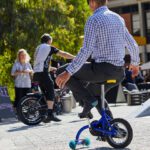Hayley’s initial plan wasn’t to do a PhD or go into research. But after a missed opportunity and some encouragement from her honours’ supervisor, she’s now on a mission to bridge the gap between health psychology theory and health professional practice.
Hayley Breare is currently completing a PhD with Curtin’s Behavioural Science & Health Research Group, co-supervised by Curtin University’s Professor Barbara Mullan, Professor Deborah Kerr and Dr Chloe Maxwell-Swift. Hayley and Barbara reflect on the research project, getting outside your comfort zone and the most important aspects of the student-supervisor relationship.
Hayley:
My journey started at UWA where I completed an undergraduate double major in psychology. After my undergrad, I took some time off and got some work experience. In 2020, I applied to Curtin to complete my honours and I had a bit of a change in direction – I worked on a project looking at social media and sleep, and that gave me a bit more of an understanding of health psychology.
My original plan wasn’t to do a PhD or go into research. I originally wanted to do the professional practice program, but unfortunately, I just missed out. With Barbara as the co-supervisor on my honours project, she then encouraged me to continue the research journey in health psychology and apply for the PhD.
My PhD is looking at ways that we can effectively train health professionals to use techniques beyond education to help their clients make lasting changes to their behaviour. We find that if we just tell people about what they need to do to make changes to their health, like eating healthy or exercising, it’s not enough to get them to change their behaviour. I have been looking at other strategies that we can use and how to get health professionals to take these strategies on board.
With my research, I hope to bridge the gap between theory and practice. We have a lot of evidence-based techniques that don’t always translate into practice with practitioners or clinicians and we’re still finding that people are not able to make these changes sustainable over the long-term. We’re looking to bridge the gap through either providing more training at the university level or professional development for health professionals.
The biggest challenge in this research space is working within other disciplines, coming from a psychology background. We do a lot of work with pharmacists and dietitians, and sometimes we don’t always align. It can be quite challenging, but we have had a great multidisciplinary team, and we’ve been doing a lot of networking with other health professionals to support research in this space. I was lucky enough to shadow a dietitian and immerse myself in what their practice looks like because our spaces are slightly different. That has been a great opportunity to learn and develop our research.
The greatest achievement of the project so far has been the upward trajectory of the workshops. We developed some workshops for dietitians in the space of behaviour change and I was lucky enough to deliver the workshops with Barbara in our first pilot session. It was a great opportunity to learn from Barbara as she’s done a lot of training for health professionals in her career. I was able to continue that training by myself. We ended up running it with over 100 dietitians, which was a great achievement. I was lucky enough to be provided the opportunity to then deliver the workshops to the students at Curtin in the Master program.
Aside from delivering the workshops, the biggest highlight of the PhD for me has been stepping outside my comfort zone and improving my confidence. I have been able to develop my presentation and teaching skills through the PhD.
Putting myself out there has enabled me to really embrace the feeling of being uncomfortable – it’s the only way to learn and grow.
I also got the opportunity to attend a conference last year with Barbara in Germany, and that was great to then be able to share my research with other people, network with like-minded researchers and make some great connections.
Barbara and I have a working relationship that is based on good communication and clear expectations. She has always encouraged me to ask questions if I’m not sure, and if she doesn’t know the answer, she always refers me on to someone who might be able to help. That’s been great, not just for the research, but also with other skills – whether it’s about delegating tasks or addressing any conflicts that come up. She’s been great at providing me with guidance.
Barbara:
Most of my PhD students come up through honours. The advantage with Hayley was that I was able to see that she had everything that I was looking for in a PhD student. We had a project that Deborah and I were working on, and at the time Hayley was working with me as a research assistant. She had the background of both the honours project and also some background in the health professional space and it was obvious then that she had what was needed.
As a supervisor, I am incredibly hands-on. One of the things that inspired me as a supervisor was to do what my supervisors didn’t. It’s not because they were bad supervisors, it was because the university I went to was quite new and without the infrastructure we have here. I was completely at a loss. Once I had the opportunity to become a supervisor, I wanted to do all the things that I didn’t get as a student.
The biggest challenge for this project is time management. While the stipends here are generous, they’re still not enough to live on. So, Hayley’s got research assistant work and professional or part-time work elsewhere and trying to balance all of that can be a lot. Obviously, if you’re doing professional work, there’s deadlines that are very concrete, whereas me saying “I want a draft” isn’t necessarily as concrete. It’s challenging as I’m often the boss that Hayley is doing work for, so I’m constantly wearing the two hats of both the boss and supervisor with competing deadlines.
For me, the biggest achievement has been watching Hayley’s confidence grow. When she started her PhD, she was very much like, ‘I don’t want to do teaching, I don’t want to tutor, I’m scared of students, I don’t want to be in front of a classroom.’ But now, she’s jumping on opportunities to teach and provide workshops.
Through this project I’ve come to realise that while there’s a place for hard deadlines and what you’ve agree upon, there’s also a place where you need to step back and reassess. Hayley’s had some life challenges in the past couple of years, and we’ve got a strong enough relationship that she was able to tell me she needed some flexibility. In that way, communication has been so important to our way of working. Hayley has taught me to know when to ease back and when to push forward.
About the researchers:

Hayley Breare
Hayley is a PhD student in the School of Population Health. Her research focuses on training health professionals in strategies to help their clients make lasting changes to their behaviour. She has delivered workshops for dietitians to foster their skills and confidence to support clients to make positive health behaviour changes.

Professor Barbara Mullan
Barbara is the Discipline Lead for Psychology and a Professor of Health Psychology Her research interests include using social cognition models to predict, change, and improve health behaviours. Her research has focused on designing theory-based interventions, including focusing on the use of behaviour change techniques.



